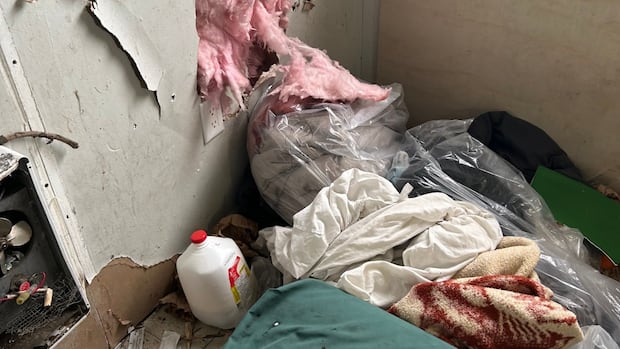
Unhygienic conditions, bedrooms without locks and assaults against residents were among the problems plaguing two supportive housing sites in Halifax before the province cut ties with the non-profit managing the locations, a government official alleged Monday.
Suzanne Ley, executive director of employment support and income assistance with the Department of Opportunities and Social Development, said she knew conditions were subpar at the sites, but the full extent of the problems was not known until Out of the Cold was dismissed and she took a closer look at the situation.
“I would say there are some pretty significant failures in things like safety and infrastructure,” she said.
Ley said she received reports of non-residents entering the sites at night and assaulting the occupants. The facilities lacked in some basic supplies, such as drinking cups. Ley also said staff were not helping residents access health care, and in some cases even “gatekeeping” or “being a barrier” to health care.
“The level of support really doesn’t reflect what is needed in a high-acuity setting like this,” Ley said.
A photo taken inside a room at the supportive housing site in Halifax in the days following the dismissal of Out of the Cold. Suzanne Ley says staff weren’t checking in on residents and facilities weren’t being cleaned adequately. (Provided by Opportunities and Social Development)
In an interview last week, Out of the Cold said it was blindsided by the split and thought it had been addressing concerns previously raised by the province. The group’s board and leadership declined to comment any further following Ley’s new accusations.
Ley’s department abruptly ended its contract with Out of the Cold last week after partnering with the group for the past three years. The group ran two supportive housing sites — one in Halifax and one in Dartmouth — with capacity for more than 60 people.
Ley said many of the residents were chronically homeless prior to being admitted, and many are dealing with drug and alcohol addiction and/or mental illness.
The province has opened several supportive housing sites in recent years, with the type of support varying by location and by resident. Ley said the two sites Out of the Cold was running are intended to provide among the most intensive level of support available.
Previous threat of termination
In August of 2023, the department told Out of the Cold in a letter that it was concerned about “criminal activity,” including allegations of drug and human trafficking, inadequate support for residents, inadequate training for staff and delays in accountability reporting.
The province threatened termination, unless a number of conditions were met.
The modular housing sites in Halifax and Dartmouth include private rooms and common areas. (Robert Guertin/CBC)
Ley said after that, the department worked with the non-profit and hired a consultant to help the group. She said Out of the Cold was showing efforts at improvement.
“We felt really optimistic in 2024,” she said.
But, she recalls, not every concern was addressed, and some issues that were addressed gradually came back.
Ley said the Justice Department has twice investigated the operations. She did not elaborate on those probes. When the second investigation began last fall, she said her department began preparing to transition to a new service provider.
The Atlantic Community Shelter Society took over for Out of the Cold last week. On the day of the transition, the Department of Opportunities and Social Development complained to Halifax Regional Police about the sites. Neither the department nor police would provide any other details.
The vice-chair of the board for Out of the Cold said last week he suspected that part of the split was due to Out of the Cold’s harm-reduction approach, which did not require residents to be sober, in a recovery program, or medicated if they were dealing with mental illness.
He said he expected new rules for residents, such as restrictions on drug or alcohol use or requirements for residents to follow prescribed treatment programs.
Ley said “residents will see and feel a difference in their day-to-day,” but insisted that did not mean rolling out new, stricter rules.
“We want to make sure that people are able to come as themselves, come with all of their challenges and be supported in whatever the next step looks like,” she said.
Ley said any changes would be in the interest of safety, such as ensuring needles are being disposed of appropriately and rooms are being kept clean.





